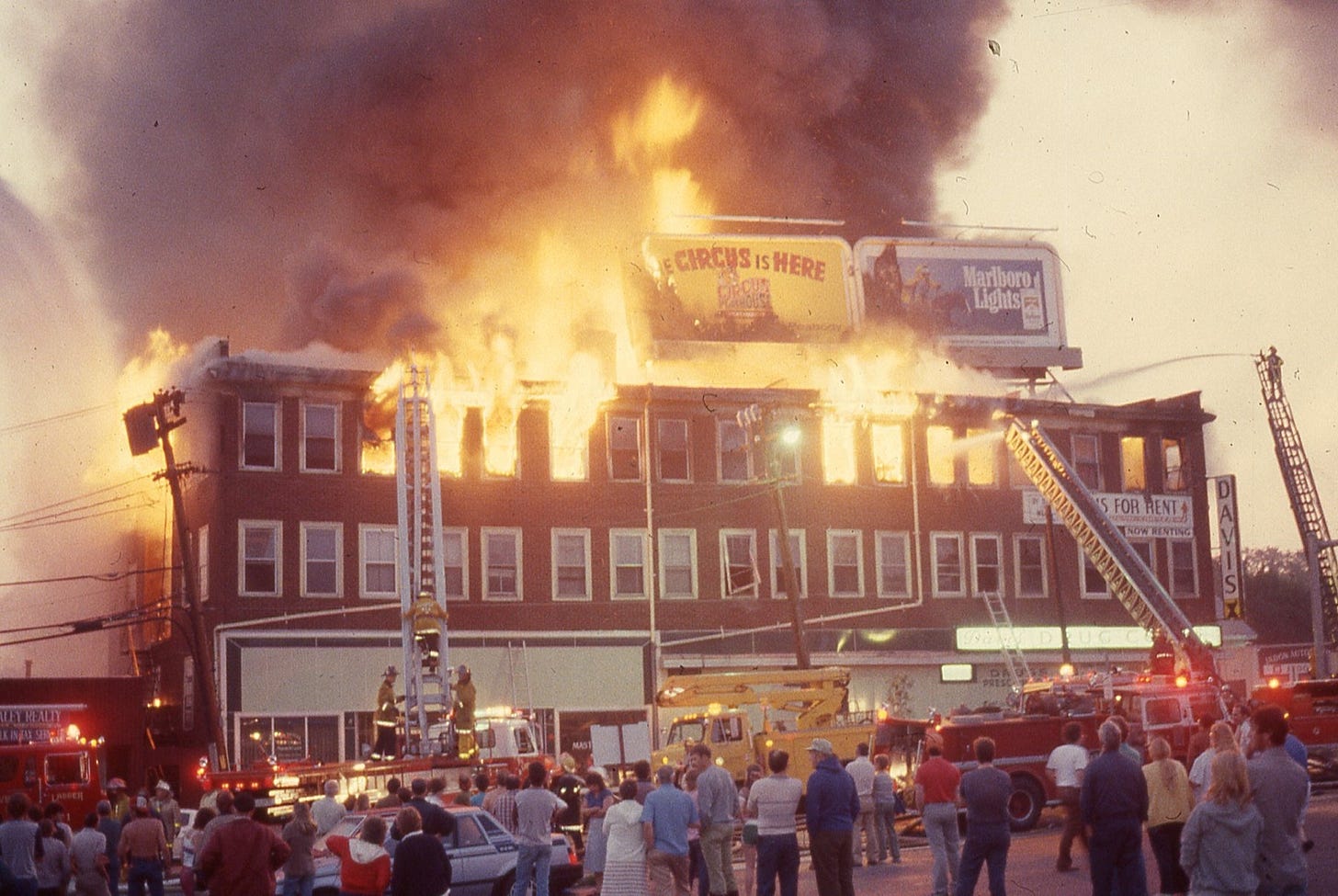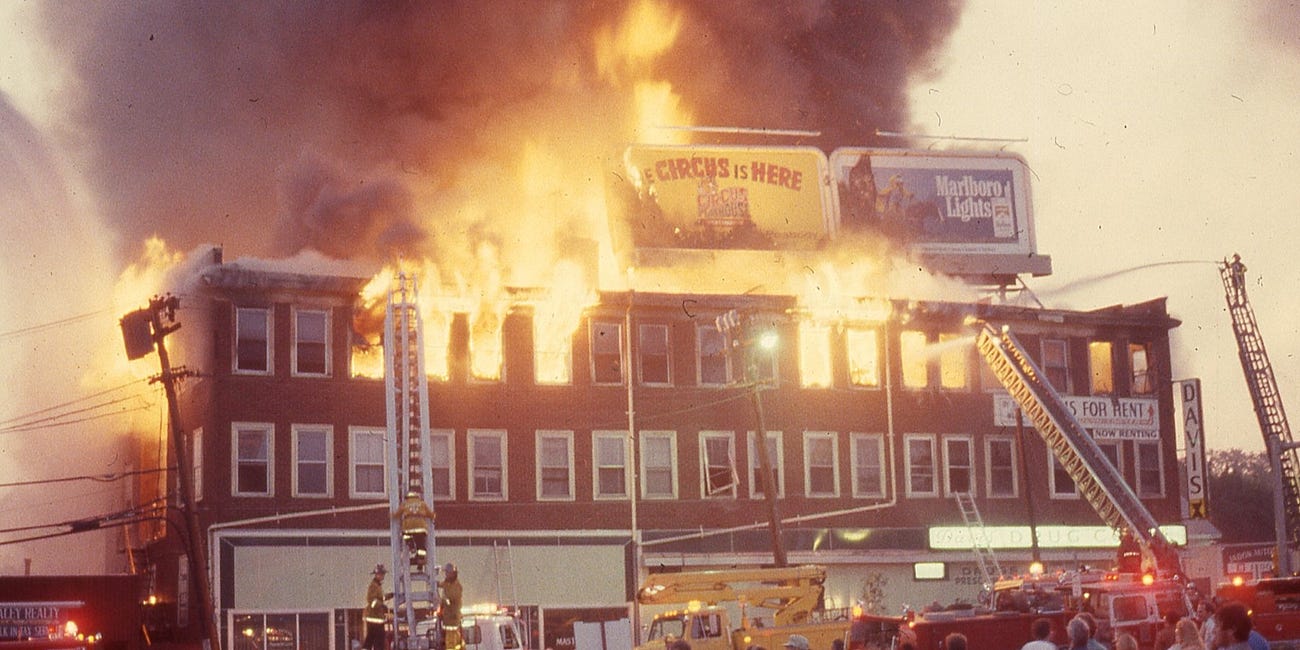DA to Appeal Ruling Overturning Murder Convictions Tied to 1984 Beverly Rooming-House Fire
Essex County prosecutors will fight ruling that overturned James Carver’s convictions in case related to infamous Elliott Chambers fire
Essex County District Attorney Paul Tucker is vowing to appeal a judge’s ruling that overturned the murder convictions of James “Jimmy” Carver, who prosecutors allege killed 15 people by starting the deadly 1984 Elliott Chambers Rooming House fire in Beverly, Massachusetts.
Carver was convicted of arson and 15 counts of second-degree murder in 1989 but has maintained his innocence during his more than three decades in prison. And on December 23, Essex County Superior Court Judge Jeffrey Karp overturned Carver’s convictions, writing that advances in the science of fire and eyewitness memory undermined key evidence presented at trial and “cast real doubt on the justice of” the guilty verdicts.
“We respectfully disagree with the ruling and, after careful review, have made the decision to appeal,” Tucker said in a written statement. “Our decision reflects our analysis of the strength of the case against the defendant, including his motive, threats, and multiple admissions to having committed the crime.”
Carver’s attorneys, Lisa Kavanaugh and Charlotte Whitmore, declined to comment on the news that prosecutors plan to appeal.
His younger brother, Bill Carver, said he was “disappointed that they are appealing it but not surprised.” He added, “I’m still confident that my brother will be found innocent.”
The Elliott Chambers fire started during the early morning hours of July 4, 1984. During the trial five years later, a prosecutor argued that James Carver caused the inferno by pouring gasoline on a bundle of newspapers and burning it outside the entrance to the rooming house because he was angry his ex-fiancee had dated a man who lived in the building.
But Judge Karp, citing new expert testimony from a five-day hearing in April and May, found that scientific research has shown important evidence presented by the trial prosecutor was flawed.
During the 1989 trial, a fire investigator testified that the blaze must have started at ground level where the newspapers were found because it was the lowest point of burn and flames can’t spread downward. The investigator also testified that “alligator charring” marks and “smoke swirling” stains left by the fire proved that it was started using a flammable liquid like gasoline.
However, Karp found that these crucial aspects of the investigator’s testimony were based on myths that have been discredited by scientific research during the years since Carver was tried.
At the recent hearing, a retired fire-safety engineer testified that the blaze’s cause could not be determined and that investigators failed to collect enough evidence to rule out electrical causes. Karp found the engineer’s testimony credible and ruled that it was significant enough to warrant granting Carver a new trial.

Karp also found that advances in the science of eyewitness memory showed that testimony from a cab driver who claimed he saw Carver outside the rooming house shortly before the fire was unreliable.
The cab driver picked someone who wasn’t a suspect from a photo array in addition to picking Carver, was shown the same photo of Carver three times before seeing him in a lineup, and was subjected to suggestive comments by law enforcement, according to Karp’s ruling.
Prosecutors have argued that despite these flaws, there is still sufficient evidence of Carver’s guilt, including testimony from witnesses who said that he threatened one of the victims the night before the fire and that he made incriminating statements afterward.
However, according to Karp’s ruling, there were credibility issues with some of these witnesses and the new scientific evidence might cause a jury to further question this testimony due to a lack of evidence corroborating that the fire was deliberately set.
The star witness at the 1989 trial testified that she was a former friend of Carver and that he tearfully confessed to setting the fire after inviting her to his home in October 1984. The witness acknowledged in her testimony that she never went to the police after Carver allegedly confessed to her. Instead, she said, investigators called her in March 1987 after she moved to New York, and she then told them about the alleged confession for the first time.
According to Karp, the “credibility and the accuracy of [the witness’s] memory suffered from her two-year delay in disclosing the admission to the police and the absence of evidence that any of the several people she told about the admission shortly after hearing it, including a Beverly firefighter, considered it serious enough to report to the authorities.”

Karp also wrote that there was a lack of reliable physical evidence tying Carver to the fire, a lack of reliable evidence placing Carver at the scene, and evidence contradicting the prosecution’s case, including testimony from Carver’s parents that he was sleeping at home when the fire started.
“At bottom, the evidence against Carver was ‘far from overwhelming,’” Karp wrote, borrowing a phrase from precedent.
Carver, 61, remains in prison while his lawyers and the district attorney’s office work to schedule a bail hearing before the Essex County Superior Court. His family and lawyers are trying to place him in an assisted-living facility because he uses a wheelchair and has complex medical needs.
Some family members of victims were distressed by the news that Carver’s convictions were overturned.
Julie Nickerson Benedix lost three family members to the fire — her brothers Rick and Ralph Nickerson and her grandmother Hattie Whary, who managed the Elliott Chambers Rooming House.
“They were buried on my 15th birthday,” Benedix said. “Since I was 14, I’ve never had a birthday.”
Rick Nickerson was the victim who prosecutors allege Carver threatened the night before the fire. Benedix said her older brother liked rock music and played the guitar, joined the US Army after high school, and eventually moved to Beverly, where he got a job and lived at the rooming house with their grandmother. He was 21 when he died.
Ralph Nickerson, at nine, was the youngest victim of the fire. He lived with his parents in Maine but was visiting his grandmother and brother at the time.
“[Ralph] had a lot of friends,” Benedix said. “A lot of the friends actually came to the funeral, which in itself was heartbreaking. … To see that many kids at the funeral was just awful.”
Benedix said she hasn’t read Karp’s decision beyond skimming it because she experiences anxiety and depression related to the fire. However, she said she remains convinced that Carver is guilty.
“I’m a little upset,” she said. “As far as whether he gets out, posts bail — whatever. I think karma already got him.”
Tracie Lee Dalton’s older brother, George Flynn, died in the fire at age 18. Dalton told The Salem News she was “astonished” to learn that Carver’s convictions were overturned, saying, “I believe that he is guilty and that he shouldn’t be let off or even get a new trial.”
But in an interview with The Mass Dump, Dalton said she harbors a small amount of doubt.
“I pretty much think he’s guilty, but I’m not conceited enough to [think] that I know everything,” she said. “I’m 99-percent sure, but that one percent tends to nag.”
Dalton said she had not yet read Karp’s ruling because she didn’t have a copy but that she plans to read one provided by this reporter. She read news articles about the ruling, she said, but couldn’t make sense of how Karp reached his decision and wanted to understand it.
She said her brother, Flynn, was a “loner” who didn’t have many friends but enjoyed spending time with family. Flynn liked to draw, build models of ships and cars, and was interested in electronics, she said.
Shortly before the fire, she said, Flynn graduated from Beverly High School and moved to the Elliott Chambers because it was near their grandparents’ home and his job at an electronics company.
“To this day, I miss my brother,” Dalton said. “I wish he was with us. He was just starting out his life, and then it was cut short.”
Dalton and Benedix both said they were contacted by the district attorney’s office but not until after Carver’s convictions were overturned. Dalton said she wished she had been notified about the hearing that led to Karp’s ruling so that she could have attended it.
Dalton said she wants an opportunity to tell Carver something she told herself more than a decade ago — that although she believes he deserves to be held accountable for the fire, she forgives him.
“When you live with something for so long, it eats away at you and you have a hole in your heart that you can’t fill,” she said. “When you forgive someone, it’s not a gift for them. It’s a gift for yourself that you just decided that you’re not going to carry this anymore, you’re not going to be bitter, you’re not going to be angry.”
Bill Carver said he empathizes with the families of those who died in the blaze.
“I share your grief for those that were lost,” he said. “But my brother has professed, as have I and the rest of my family, that he is innocent of anything to do with that fire.”
Now that the case has been appealed, it will be reviewed by one of the state’s two appellate courts. Normally it would go to the Massachusetts Appeals Court, and whichever party were to lose would have the option to appeal to the Massachusetts Supreme Judicial Court. However, the SJC has the discretion to review the case directly if one of the parties requests it.
Under the current legal standard, the justices will only reverse Karp’s ruling if it is “clearly erroneous,” according to Boston-based lawyer Rosemary Scapicchio. Prosecutors, she said, must show that “there’s something egregious that the judge did that the judge shouldn’t have done.” (Scapicchio said she knows James Carver’s lawyers and has spoken to groups of students from the Boston College Innocence Program, where Whitmore works, but was not compensated for speaking and was not involved in representing Carver.)
“It’s a pretty tough standard for the Commonwealth to meet,” Scapicchio said. “It’s a very thorough decision [by Karp]. He explains in detail why he credits certain things and he doesn’t credit certain things, and a lot of it is going to be his credibility determination as far as [the new expert] witnesses are concerned.”
According to Northeastern University law professor Daniel Medwed, “It is quite common for prosecutors to dig in their heels and appeal new-trial orders in part because of confirmation bias AKA tunnel vision. Over time, prosecutors tend to become increasingly invested, psychologically, in their theory of guilt and it becomes hard to convince them otherwise.” (Medwed serves on the New England Innocence Project’s board of trustees with Kavanaugh but was not involved in representing Carver.)
Medwed said that prosecutors can also be affected by cognitive dissonance, a term psychologists use to describe the mental discomfort that people experience when holding two conflicting beliefs.
“Many prosecutors view themselves as wearing a white hat, as coming to the rescue for justice, and anything that suggests otherwise, that they played a role in a wrongful conviction, may cause some dissonance that they feel compelled to reject,” Medwed said.
It will likely take about a year for a decision on the appeal to be reached, according to Scapicchio, who noted that justices must review transcripts and other documents in addition to reading the parties’ briefs and holding oral arguments.
If the district attorney’s office loses the appeal, prosecutors have the option of retrying the case, although it could be an uphill battle due to the flaws in the original evidence and the fact that many of the investigators and other witnesses have died during the more than three decades since Carver was convicted.
“They’re supposed to evaluate their case and determine, Can we try this again?” Scapicchio said. “Do we still have the witnesses from 30 years ago? … Has there been a significant change in the science so that our witnesses would be limited in what they could say scientifically?”
Thanks for reading!
If you’d like to keep The Mass Dump running, please consider offering your financial support, either by signing up for a paid subscription to this newsletter below, becoming a Patreon supporter, or sending a tip via PayPal or Venmo. It takes a tremendous amount of work to bring you stories like this, and I rely on your support to keep doing it. A monthly subscription is just $5!
Even if you can’t afford a paid sub, please sign up for a free one to get updates about this story, and please share this article on social media.
You can follow me on Bluesky, Mastodon, Twitter, and Facebook. You can email me at aquemere0@gmail.com.
You can read my original feature story about the James Carver case, which takes a deeper look at the evidence, here:
Science Proves Man Convicted of “Worst Mass Murder in Massachusetts History” Is Innocent, Lawyers Argue
James Carver is serving life in prison for a deadly fire but for decades has insisted he is innocent — and his lawyers say they have the scientific evidence to prove it
Anyway, that’s all for now.






